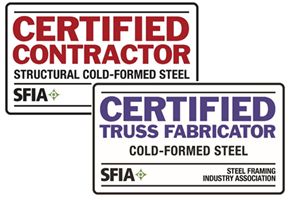 Commonly Asked Questions Commonly Asked Questions
Q. Who is eligible to become certified?
All professional contractors who are SFIA and AWCI members in good standing are eligible for the certification program.
Q. Why become certified?
SFIA Certified Contractors offer tremendous value to general contractors, developers and owners because they have taken the time and effort to become experts in cold-formed steel installation. This expertise results in much more efficient installation and the highest levels of quality on construction sites, which translates to cost savings, faster approvals, and improved revenue streams.
Q. Why become a certified truss fabricator?
Certified Truss Fabricators demonstrate expert knowledge of CFS floor and roof truss design and assembly as evidenced by the SFIA, the leading CFS construction industry association. Certified fabricators offer proven ability to turn exacting engineering specifications into truss systems that meet the most stringent design requirements. Through this certification, owners, building authorities, and general contractors are assured of efficient installation and high quality.
Q. I only do nonstructural cold-formed steel framing. Can I be certified?
Yes. Two separate certifications are available for nonstructural and structural expertise.
Q. I install structural cold-formed steel as well as nonstructural. Do I need to be certified for both?
Structural certification automatically includes nonstructural certification.
Q. How do I become certified?
Several steps are involved. The first is an application process, followed by an online test for nonstructural and/or structural cold-formed steel construction knowledge. Applicants also provide affidavits certifying compliance with the SFIA Code of Ethics, quality management system, and safety program. Finally, a third-party observation of installation skill is required.
Q. How do I take the online test?
Once your application has been approved and enrollment fee has been processed, you will be sent a link to an online structural or nonstructural exam. The cost of this exam is included in the initial enrollment fee. However, if you are certifying multiple offices, there is an additional exam fee for each.
Q. How does the third-party observation process work?
You select a professional engineer who visits one of your jobsites to observe your installation. The installation must be at least 75 percent complete from a CFS standpoint, and must be either structural or nonstructural framing to meet the certification that you desire. The observation will follow an SFIA protocol and the engineer must provide a sealed report on the successful result. You are responsible for all fees associated with the report.
Q. How much does it cost to become certified?
It depends on the kind of certification you require. Nonstructural certification costs $600, while structural certification costs $750. There are also fees associated with testing and observation, which will vary depending on certification type.
Q. How long does certification last?
Certification is valid for one year, from the date issued, with the option to renew annually.
Q. What kind of continuing education is required when applying for re-certification?
With initial certification, no continuing education (CE) is required. In subsequent years, the SFIA requires that the certified contractor's office complete five (5) CE credits annually. These CE credits should be obtained during the prior year, and documentation is required. This requirement is not limited to courses on CFS, or to the contractor. Credits can be obtained by any member of the contracting firm, on any topic of interest associated with the construction industry. Examples include building science, construction law, risk management, and safety.
Q. How will SFIA promote my certification?
SFIA will help promote member certification in two ways: first, by utilizing the association’s promotional channels and tools; second, by providing certified contractors with their own “toolkit” to promote their expertise within their own markets.
Q. Is certification available to me if my company is outside the United States?
Yes. In addition to US contractors, both Canadian and Mexican-based contractors are able to become certified.
|